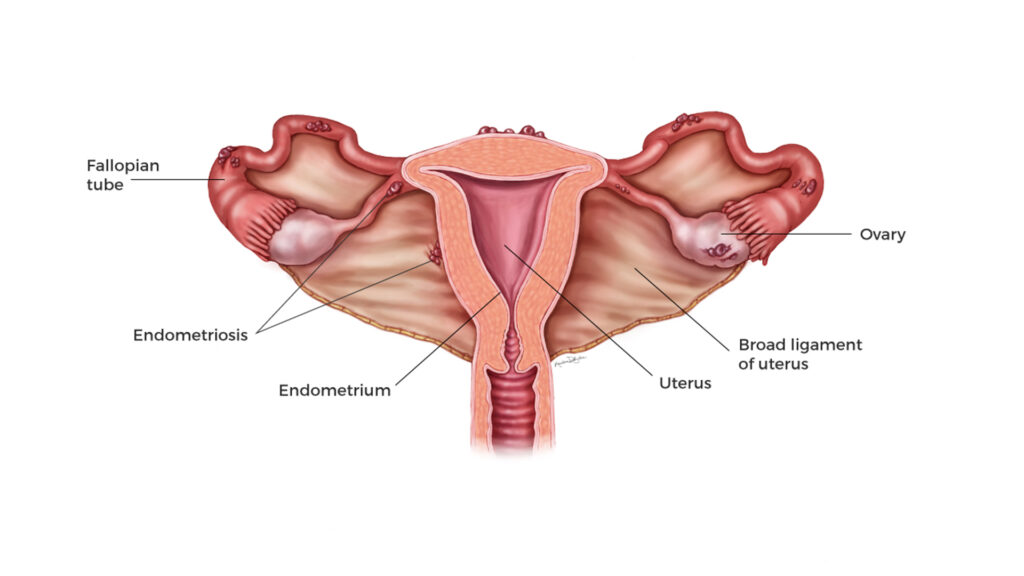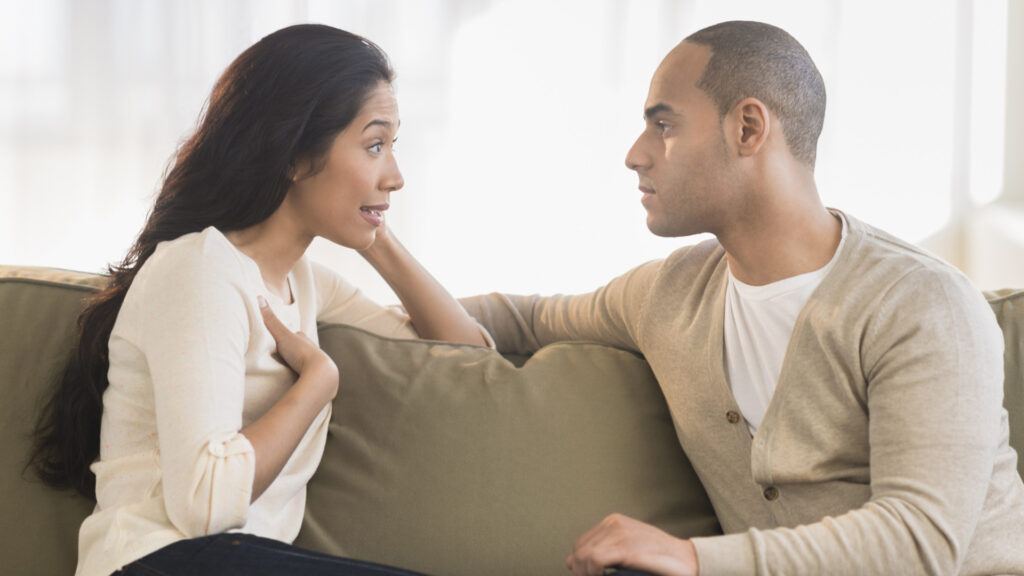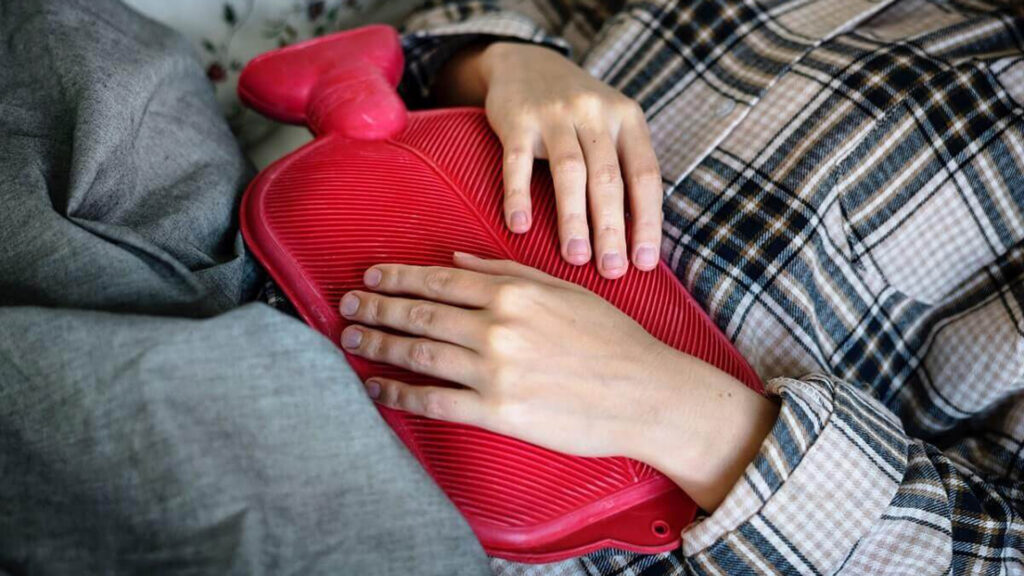
It’s finally happened. You’re madly in love with a dreamboat unlike anyone you’ve ever met. Their smile is contagious, they’re funny as hell, they bake as much as you do, and best of all, they can karaoke like nobody’s business. You’ve never been more smitten, the wedding bells are practically playing – until a month in, when they cancel a date with you with only an hour notice. It’s so unlike them, your heart stops.
The next day, when you find an excuse to head over to their house and they answer back, you see that they look exhausted. Dark circles gather like clouds under each eye. Right there, standing in their kitchen, they finally level with you: your dream lover tells you they have endometriosis.
Unpredictable, incurable, and a lot for a new partner to handle, endometriosis is a drag that nobody wants to add to their daily life. The disease creeps up on you. Like ivy covering a house, suddenly your partner woke up one day and realized that the dang thing was everywhere.
But the disease doesn’t change how you feel about someone you’re seeing. Whether you just started dating someone who’s had it for a decade or have a long term partner who received their diagnosis last week, as long as you’re with them, endometriosis will be a staple of your life.
It’s one rough ride – but you two don’t have to go it alone, and you have the power to make life sweeter for your sick sweetie.
You can’t help your partner feel their best if you don’t know the details about what they’re facing every day. Get a handle on the situation by familiarizing yourself with at least the basics. That way, you can speak to it better, so they don’t have to always explain themselves.

Here’s the gist of it: the lining of the uterus somehow jumps out of the uterus and burrows into organs, muscle, and other parts of the body, forming lesions. Depending on how severe growths are, they are classified in four stages.
Although that sounds similar to cancer, it’s actually a nonfatal disease whose symptoms include debilitating pain, long and heavy periods, weight loss, nausea, “endo belly,” fatigue, muscle soreness, infertility, nerve pain, migraines, and painful penetration. So strange it’s even been featured on House and Mystery Diagnosis, endometriosis is anything but predictable, and some doctors believe it’s an autoimmune disease, which would mean that there are a whole host of other problems that come with it, but there isn’t enough research yet to be sure – super frustrating, right? If you ask anyone with endometriosis, we’ll probably tell you that judging by the mountains of research on erectile dysfunction or baldness and the measly handful of data on this painful disease, it’s under-researched because the disease only impacts folks with uteruses.
Whatever the case, although endometriosis is (mostly) not deadly, it is anything but simple. It may start in the uterus, but growths can travel all the way to your brain, heart, and lungs, leading to life-threatening symptoms like seizures and lung collapse.
But the worst part of it all may just be how isolating it feels. Although 200 million people around the world battle endometriosis every day, there are few things that make you feel more alone than having a disease not even doctors understand. Learning about your partner’s diagnosis and knowing where the endometriosis is located in their body shows your partner that they’re not alone.
In fact, most folks in the chronic illness community agree that one of the kindest things a partner or friend can do for them is read up on their disease. It may not exactly be romantic, but your partner will get big ole heart eyes for you every time you’re able to spout the latest research or tell someone else about endometriosis, so they don’t have to.
Dating someone with a mystery disease is a mixed bag. On the one hand, you get to feel a little like you’re dating a poorly functioning member of the X-Men. On the other, we’re basically always unpacking all the baggage that comes with our illness – and need someone to help us process it all.

Listening to your partner dissect their health is essential to any good relationship with someone who has endometriosis. But that listening ear sours if you head into a conversation trying to give a solution at every turn. You may feel powerless listening and genuinely think you have a helpful solution, but they feel powerless too – and telling your partner what they could or might do doesn’t help them feel in control.
Besides, we’ve probably already tried whatever new idea you have up your sleeve. You don’t struggle with a disease for years without learning every trick in the book. Don’t bother telling us to try yoga; we already have. Massaging it out? Done that. When a disease is chronic, it’s only annoying to have a healthy person wag their finger and tell us what we should do to fix ourselves.
Instead, talk to your partner like a regular human. You can and should still share new things you learn. If you’ve read some fabulous new cure or research, and truly think it could help, then go for it. But don’t tell them about it while they’re sad and looking for comfort. Instead, bring up whatever you learned during a quiet time, while cooking dinner or reading in bed. Take it from me: it’s a lot easier to listen to a new health suggestion when not in the throes of pain.
If you’re set on helping them feel better, there is one thing you can do: ask them what they need. It may seem overly simplistic, but you’d be amazed at how seldom people just ask straight up what a chronically ill person needs. With one simple question, you can both have more control over managing this disease.
This may seem like the simplest ask in the book, but you’d be amazed by how often people think endometriosis is a lie. Even doctors write people with endometriosis off as whiners who can’t handle a few cramps.
No matter how long you’ve been together, there’s nobody who knows their body and their disease better than your partner. They’ve lived with this disease since it first appeared in their bodies, and even if they talk to you about their pain pretty openly, there’s no doubt that they’re keeping some of their darkest thoughts about it to themselves.
If you heard every thought about endometriosis that went through your love’s head, you’d be disturbed. The disease zaps you of energy on a whim, and the pain often disappears just as quickly as it came. You may have read exciting things about some new diet, fitness regimen, or supplement, but there’s no cure. This chronic condition lingers in our bodies forever. To say it’s frustrating is an understatement of the century – and nobody knows the misery better than the person whose body is experiencing it.
And usually, all we have is our own gut to go on. Because the disease can only be diagnosed through surgery, and can’t be detected on ultrasounds or MRIs, we can’t know where and how extensively growths have come back until we’re literally cut open. So when your partner with endometriosis says they’re in pain or something is wrong, don’t question it – trust them, listen to them, and help them with whatever they might need.
Your new partner may be crazy about you, but there’s one thing that steals their holds a more precious place in their heart than you do: their heating pad. If there’s one ultimate weapon against an endo flare up, it’s a strong heating pad and a cup of tea while curled up in bed. You don’t know how much you need one until you’ve been in pain for two days straight in the middle of a busy work week.

If you and your partner live together, you probably already have one somewhere. But if you live in separate homes and your partner comes over to your place ever, be the best significant other ever and buy a heating pad to stash at your place. Even the worst pain days are no match for a heating pad. For extra relief, get some castor oil and rub it into your love’s belly first.
Too soon to buy a heating pad? If you’ve just started seeing someone with endometriosis, even a casual hookup will appreciate you having some ibuprofen in the house. Pain relievers take the edge off a bad flare, and can help your partner push through and make the most of the rest of the night.
Those of you looking to score the most brownie points should buy a box of gluten-free, dairy-free cookies to have on hand. Endometriosis comes with all kinds of weird dietary restrictions, and your partner’s pain will feel a whole lot better if they can nibble on a snickerdoodle while lying under that heating pad.
When endometriosis pains strike, they come out of nowhere. It’s hard to anticipate, and while some lifestyle changes may help to a degree, even the healthiest, athletic yogis with a consistent meditation practice find themselves bedridden from endometriosis pain some days. If you’re really concerned about your partner on a big day, bring ibuprofen with you to amusement parks or out dancing.
If they had a big flare-up recently, you can even check in before going out. A simple “Hey, do you need anything for your sweet bod before we head on out?” can help your partner feel taken care of and heard without feeling defensive.
The road to hell is paved with good intentions. One of the worst slaps in the face when you have a chronic illness is when a lover treats you like a child made of glass. We’ve already dealt with it from family members, teachers, and friends. When the person you are lusting after treats you like someone to coddle, it can be infuriating and embarrassing.

Your partner may need help with certain things sometimes. On bad pain days, you might need to help massage them, make a cup of tea, or draw them a bath. On real bad pain days, they may need you to help them up the stairs after a surgery.
But even on those worst days, your partner is still an adult capable of making their own choices. If they are determined to go grocery shop, participate in a kink party, or want to get down and dirty with you – trust them. Your partner knows their body best, and if they’re telling you it’s time to bust out the flogger, that’s their choice.
Your partner has probably spent a long time being talked down to and neutered by concerned people. Just like with how you should trust them to know their bodies best when it comes to a wellness routine, you should believe your partner when they voice their autonomy, too.
All too often, a disease affecting the reproductive organs leads to one big question: what about babies?
Most people with endometriosis have a very complicated relationship to childbearing. Even if they didn’t think they wanted children, the loss of that option can feel almost as painful as it would if they wanted kids. And from a young age, people with endometriosis are pressured to have children, since giving birth might help reduce the symptoms.
Obviously, the more serious you get with a partner, the more important the talk about having children becomes. But whether or not your partner can have bio children should never be a reason to continue dating them or not. With the right person, it’s not a big deal. Adoption is a thing. If you both want to be parents, you can still enjoy a fulfilling family life that includes children with your partner.
Wouldn’t you rather be with the love of your life and adopt a baby than be someone who settles for someone alright because you’re really hoping for babies that look like you? It’s kind of weird, when you think about it. And adopting a baby doesn’t make the child any less yours, no matter what my mean grandmother says.
And this about more than you and your wants. Your partner is probably sick to death of hearing about babies. If I had a dollar for every time someone told me I could “always adopt,” as if that magically undoes all the suffering endometriosis causes, I’d be richer than Oprah by now. While many people with endo do worry about babies, it’s often the least of our worries.
Instead of being yet another person who talks about adoption and kids, ask about other ways they’ve struggled instead. Many folks with the disease have set goals, ambitions, and intimacy to the side – and they’d much rather talk about that than mull over the successes of in vitro fertilization for the ten thousandth time.
It’s a given that endometriosis impacts your sex life to at least some degree. It’s a disease peppered with never-ending bodily changes, meaning nothing is fixed. What worked one day for you and your partner may not work on a bad flare day. On those days, penetration may be off the table – and that’s something you will just have to get used to.

Thankfully, intimacy doesn’t end or begin with penetration, and people with endometriosis also have a handy little button called the clitoris, which is arguably the seat of our pleasure anyway. The nipples, too, can offer up their own sweet orgasms without ever dipping below the belt.
And even if it’s painful sometimes, your partner may very well crave penetration with a finger, a dildo, a penis, or anally. As you find what feels good, you can both make the discovery process fun. Try new positions and be open to making adjustments.
To thrust away freely, invest in an Ohnut. This adjustable, squishy ring goes around the base of a penis or dildo, keeping you from going too deep so you can play with abandon. The soft material feels good for both parties, and since it’s easy to expand or remove, you can adjust quickly while going at it. Many people report feeling like they have reclaimed their sex life through this one simple sex toy purchase.
But painful penetration isn’t the only way endometriosis changes your sex life. A long period may be just as likely to make you shuffle your intimacy around – trust me. Once, I had a period that lasted for twenty months. If you’re bad at math, that’s almost two years I spent bleeding. The only possible perk to that nightmare was that I could have funded my heating pad and painkiller purchases by selling thousands of dollars of niche worn period panties (a major missed opportunity on my end).
Dating someone with endometriosis, you’ll quickly get used to having period sex. Even if it’s unusual to you at first, laying a towel down before you go at it will soon become second nature. And if you’re a true team player, you can still sixty-nine all day without a problem – it just takes an attitude adjustment. But for mindblowing sex, I think we all are willing to adapt.
Sometimes, people with severe endometriosis have entered young menopause. If you’re under forty-five, you’ve probably not slept with someone who’s menopausal, and your partner’s bodily needs may surprise you. If your lover’s dry no matter how long you eat them out, don’t take it personally. Thankfully, the fix is simple: lube. Lots of it.
I wish the problems ended with physical ailments, but endometriosis has one final symptom that nobody talks about, one that impacts our sex lives just as thoroughly as all the others: body image issues. Wreaking havoc on your hormones, endometriosis makes many people struggle with unpredictable weight and acne. Add to that fatigue, surgery scars, and bloating so bad we call it “endo belly,” and virtually all of us have a strained relationship with our looks. On certain days, your partner may be shy about their bod. Kiss their belly, scars and all, and remind them of all the ways they’re a total sex pot of your dreams.
This may all sound like sex with endometriosis is always the worst, but believe it or not, people with endometriosis still have amazing and fulfilling sex lives. I’ve had endometriosis for thirteen years and my job is literally writing about great sex – so trust me. Folks with endo are still thirsty like the rest of the world. You may just need to be creative to get us off.
Endometriosis is a journey your partner will be on for life, whether you’re there or not. Even if you're both only together for a short (good) time, be mindful of how you interact with them about intimacy and sexuality. The words you say and the way you treat them with their disease will stick with them for a long time.
By accepting whatever your partner’s body is up to, and listening to them, you’re laying the groundwork for a satisfying and bright future together. Even if you’re new to the game and have never dated someone with a chronic illness, remember: endometriosis doesn’t define the person you’re canoodling. They have a million other facets that make up their lives. Buried under the heating pad and ibuprofen, we have dreams, favorite things to do, hopes, and end-of-year goals. We’re vibrant, sexual, and dynamic. It’s up to you to see past our disease – and when you do, you might just be rewarded with the partner of your dreams.